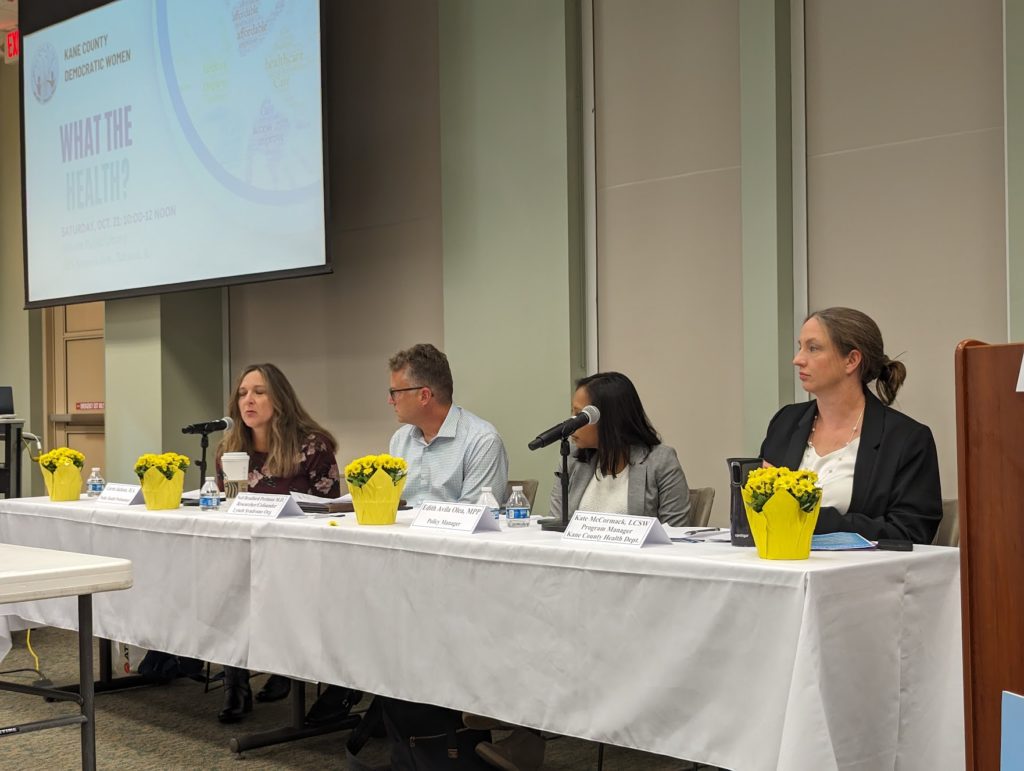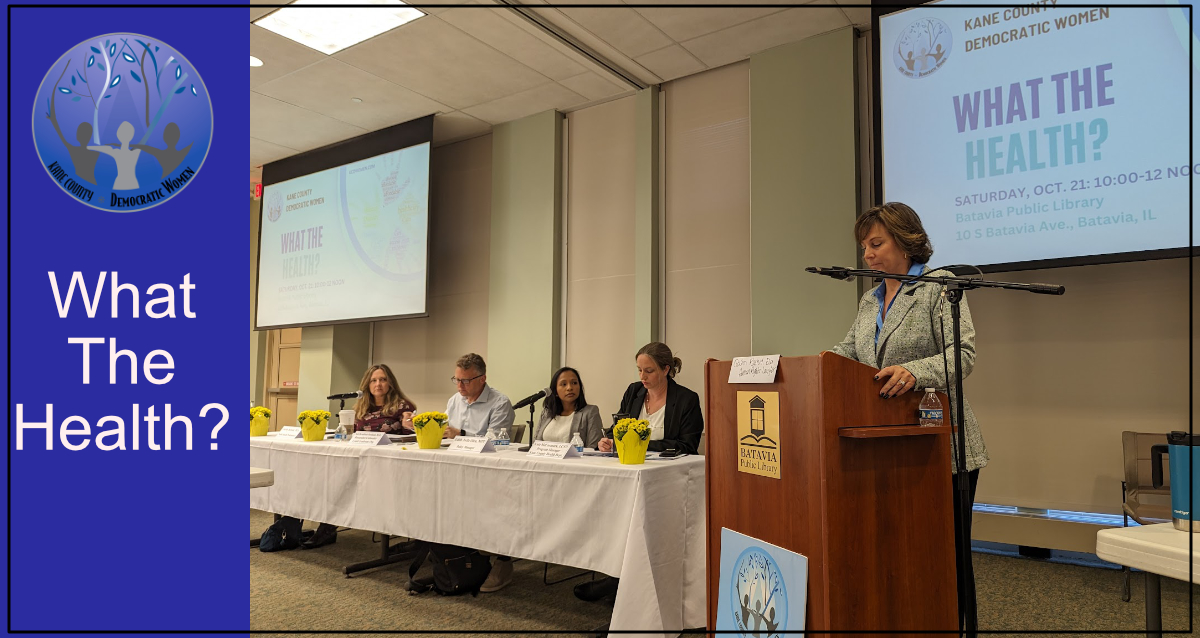On October 21, 2023, the Kane County Democratic Women presented their final 2023 forum, entitled “What the Health?” at the Batavia Public Library. The forum panelists included Dr. Neil Perlman, MD.; Carrie Jackson, a community organizer and advocate for equity; Edith Olea, a policy manager who works for the Illinois Coalition for Immigrant and Refugee rights; and Kate McCormack, a social worker who is a program manager for the Kane County Health Department.
The program began with a short film that answered the question so many Americans have: Why is America the only developed country without universal healthcare? There are several reasons, and the most important one is the way we view healthcare. Most countries view healthcare as a human right, which is available to all. America views healthcare as a paid privilege.
Universal healthcare was first proposed by President Harry Truman in 1945, and it was embraced by the majority of Americans when he introduced it. Truman saw that the poor had access to healthcare through charity, and the wealthy class had the money to pay for it; but the middle class was the only class that was burdened by healthcare costs and no programs to help them. Truman’s plan never came up for a vote: the southern states-controlled Congress and did not want payroll taxes to pay for healthcare for minorities that were poor. The AMA also fought against the plan, stating that the government would control doctors’ practices, even though Truman pointed out that the plan he proposed was not like the National Health Program in Britain. Years later, President Lyndon Johnson signed Medicare into law when the country realized that many older Americans who were no longer employed were lacking access to healthcare insurance. Truman sat beside President Lyndon Johnson as he signed Medicare into law. President Johnson said Truman was the real father of Medicare.
Years later, Hilary Clinton attempted to design a universal healthcare plan, which was immediately attacked by the propaganda on TV promulgated by insurance companies. Obama’s Affordable Care Act was adopted from Hilary’s plan and finally passed because the insurance companies saw that it gave them a large piece of the pie by adding low-income people to the plans and receiving government subsidies for them. When some companies realized that they were not making huge profits, they dropped out of the ACA. With these plans, the middle class still suffers because premiums are based on income, and some self-employed middle-class families are paying thousands per month for insurance with high deductibles.
One of the panelists shared his personal experience with healthcare. His daughter requires a medication that costs $1,000 per month, and his health insurance denied the claim, even though he has filed numerous appeals. And that’s one of the issues that many people on Medicare Advantage plans have also faced when those plans refuse to allow patients access to rehabilitation care when their doctors say that they need it.
Pharmaceuticals produced in the U.S. cost more here than they cost in other countries. It’s because there is no single payer bargaining as there is in countries with universal healthcare. A 2003 law restricted Medicare from negotiating for drugs, which means seniors pay some of the highest drug prices in the country. It’s shocking to see how insurance companies and drug companies gouge the most vulnerable population with high prices for drugs seniors need to survive.
Many elderly people do not realize that when they choose a Medicare Advantage plan instead of regular Medicare, they are no longer on Medicare. (Ironically, the name Medicare appears before those plans, and it shouldn’t.) The Advantage plans are run by private insurers who can deny services, which original Medicare almost always approves. Many people choose Advantage plans because enrolling in Medicare Part B (around $165), a health supplement plan (around $135), and a prescription drug plan (around $10) costs about $310 a month for one person. The cost of the Part B plan is higher than $165 for high-wage earners. And the cost of the monthly supplement plan increases with age.
Most Advantage plans waive the fee for medical and drug plans (approximately the $145) paid for the supplement and drug plan because these companies are receiving large monthly payments (around $1000 a month for each person) from Medicare to take these patients. The Advantage plans are profiting from the large Medicare payments and then denying claims for expensive tests or rehab stays, which doctors have ordered for elderly patients. The cost of Medicare Part B is income-based too, and it’s hard to believe that in 1965 Medicare Part B cost $3 a month instead of $165 as it does today.
Ironically, many doctors have ended up with the situation the AMA was opposed to in the 1940s. Large corporations are buying the doctors’ practices and running them like a company, telling doctors how much time they can spend with patients and moving them to different offices as needed. Doctors want to do what is best for patients, and when they order rehab, it’s because the patient needs it to recover fully.
When insurance is profit-based and run by equity firms concerned about shareholder profits, quality goes downhill. Healthcare professionals are not paid enough, and that’s why there is a shortage of skilled healthcare workers, such as nurses.
Some of the general public is still opposed to universal healthcare. They don’t realize that the Affordable Care Act programs for low-income earners and Medicaid programs prevent costly conditions. When uninsured people go to hospital emergency rooms, it is much more expensive than going to a primary care doctor, and we all pick up that expense. Doctor Perlman stated that we have a choice, “Are we going to put sick people outside the city limits to be eaten by wolves, or are we going to serve them?”
Carrie Jackson stated that many low-income workers are homeless. And Edith Olea stated that many minorities spend 30% or more of their income on rent, and they cannot afford healthcare. Also, the major cause of bankruptcy is medical debt. Uninsured people are afraid to go to the doctor. They know that if they can’t pay the medical bill, it goes on their credit report, which affects their ability to buy a car to go to work and can even affect their ability to get a job.
Carrie and Edith agreed that community-based healthcare might be the best solution. And it would include the services of primary care doctors and other servcies like vision, dental, and mental health providers. Kate McCormack who is the Manager of the Children’s Mental Health Initiative in Kane County talked about the importance of mental health programs for children and the isolation issues that Covid caused, which has brought about additional stress. All the forum members agreed that children are the most affected by inequities in healthcare, and there is little mental health coverage for children between the ages of 3 to 5 who cannot express their feelings.
In our current system, the small community-based hospitals are the hospitals that are closing unless they are taken over by the profit-based corporations that are purchasing hospitals. The goal of a single-payer system is to keep community-based hospitals open.
Some solutions that the speakers proposed were:
- Automatic yearly re-enrollment of all kids in healthcare
- Enactment of a mental health policy
- Simplification of the Medicare/Medicaid/American Indian healthcare systems, which includes simplifying paperwork for patients and hospitals
The conclusion of the forum focused on how to change the system. Edith Olea was right when she said we don’t have the money to compete with the propaganda on TV, but we have the most important asset: many people who want change. We can do the following and have the power to change the system:
- Tell our stories in the community and educate other people about what is happening.
- Organize together and hold rallies and educational meetings.
- Encourage people to talk to their representatives in Congress. If enough people write letters and call, it gets attention. They want your vote.
- Contact the Single Payer Coalition and Physicians for a National Healthcare Plan and request literature and perhaps a speaker for an event.
- Ask legislators to support bills for Medicare for All and medical debt prevention bills.
- Be an advocate for universal healthcare for everyone.
Most of all, do not believe the propaganda on TV paid for by profitable insurance companies. Seek education on the topic and become involved. Research studies and articles are right at your fingertips. Look at the source of the article and make it sure it is not a profit-based company.
Editorial Writer, Linda Willet
Kane County Democratic Women
P.O. Box 1193, St. Charles, IL 60174
www.kcdwomen.com


